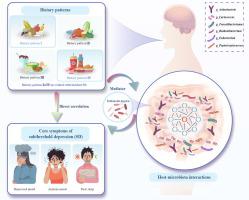当前位置:
X-MOL 学术
›
J. Adv. Res.
›
论文详情
Our official English website, www.x-mol.net, welcomes your feedback! (Note: you will need to create a separate account there.)
Associations between specific dietary patterns, gut microbiome composition, and incident subthreshold depression in Chinese young adults
Journal of Advanced Research ( IF 11.4 ) Pub Date : 2024-06-13 , DOI: 10.1016/j.jare.2024.05.030 Xiumin Jiang , Xiaotong Wang , Meng Zhang , Lin Yu , Jun He , Shengwei Wu , Jinglan Yan , Yuanjia Zheng , Yuanyuan Zhou , Yongjun Chen
Journal of Advanced Research ( IF 11.4 ) Pub Date : 2024-06-13 , DOI: 10.1016/j.jare.2024.05.030 Xiumin Jiang , Xiaotong Wang , Meng Zhang , Lin Yu , Jun He , Shengwei Wu , Jinglan Yan , Yuanjia Zheng , Yuanyuan Zhou , Yongjun Chen

|
The interplay between influential factors and the incidence of subthreshold depression (SD) in young adults remains poorly understood. This study sought to understand the dietary habits, gut microbiota composition, etc. among individuals with SD in young adults and to investigate their association with SD occurrence. Employing a cross-sectional approach, 178 individuals with SD, aged 18–32 years, were matched with 114 healthy counterparts. SD status was evaluated using the Zung Self-rating Depression Scale (SDS), Zung Self-rating Anxiety Scale (SAS), Beck Depression Inventory 2nd version (BDI-II), the 17-item Hamilton Rating Scales of Depression (HAMD-17), and Pittsburgh Sleep Quality Index (PSQI). Metagenomic sequencing was utilized to identify fecal microbial profiles. Dietary patterns were discerned via factor analysis of a 25-item food frequency questionnaire (FFQ). Logistic regression analysis and mediation analysis were performed to explore the potential links between gut microbiota, dietary patterns, and incident SD. Data on dietary habits were available for 292 participants (mean [SD] age, 22.1 [2.9] years; 216 [73.9 %] female). Logistic regression analysis revealed that dietary patterns Ⅰ (odds ratio [OR], 0.34; 95 % CI, 0.15–0.75) and IV (OR, 0.39; 95 % CI, 0.17–0.86 and OR, 0.39; 95 % CI, 0.18–0.84) were associated with reduced risk of SD. Distinct microbial profiles were observed in young adults with SD, marked by increased microbial diversity and taxonomic alterations. Moreover, mediation analysis suggested as a potential mediator linking SDS or BDI-II scores with a healthy dietary pattern rich in bean products, coarse grains, nuts, fruits, mushrooms, and potatoes (β = 0.25, 95 % CI: 0.02–0.78 and β = 0.18, 95 % CI: 0.01–0.54). Our findings highlight the complex interplay between dietary patterns, gut microbiota, and the risk of developing SD in young adults, underscoring the potential for dietary interventions and microbiome modulation in mental health promotion.
更新日期:2024-06-13











































 京公网安备 11010802027423号
京公网安备 11010802027423号